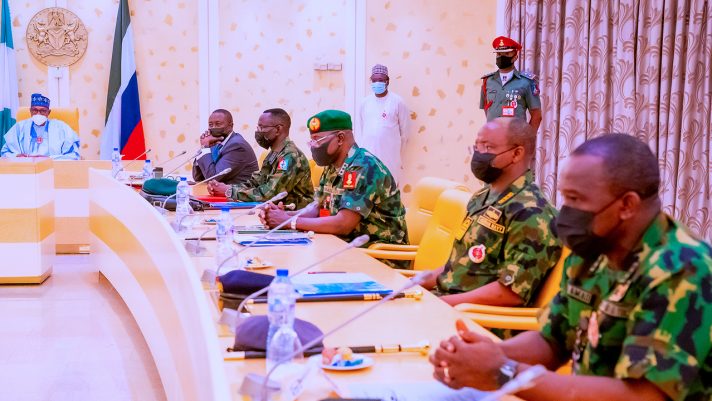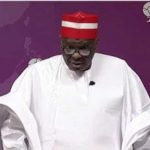By Geoff Iyatse (Lagos) and Odita Sunday (Abuja)
Perceived gap between result and President Muhammadu Buhari’s $1 billion spending on anti-terrorism war is drawing shocked reactions from stakeholders, who insist the country is not any safer today than it was at any time in its history.
Experts, who admit military hardware are expensive all over the world, are not as concerned about the huge spending as they are about the results from government’s efforts.
Buhari had revealed that his government spent $1 billion to acquire weapons to carry out sustained operations against insurgents since 2015. He said through military operations, Nigeria has been able to reclaim territories seized by Boko Haram.
“When I assumed power in 2015, Boko Haram held about two-thirds of Borno State, half of Yobe State, and a couple of Local Council Areas in Adamawa State, all in the North East of Nigeria. We have been able to retrieve these swathes of territories by investing over $1 billion to acquire hard and software weaponry from the U.S. and other friendly countries to carry out sustained operations against insurgency since 2015.
“Our Armed Forces and those of our partners in the Multinational Joint Task Force (consisting of Chad, Niger, Cameroun, Benin Republic and Nigeria) continue to demonstrate great bravery while paying the ultimate price in securing our collective freedom,” the President said on Tuesday, at the African Conference for Peace in Nouakchott, Mauritania.
Military spending has ballooned in recent years amid escalation of insurgency and terrorist attacks. This year, for instance, defence is taking as much as 13.4 per cent or N2.98 trillion of entire spending, leaving little for critical drivers of growth, such as health and education.
The defence budget is more than twice what is earmarked for infrastructure (N1.4 trillion) and close to double of the health sector’s N1.5 trillion allocation.
Whereas experts have acknowledged the need to scale up security to protect life and property, there are concerns that the unbalanced spread of the country’s resources across critical sectors would create another social insecurity that could worsen the outlook.
Speaking with The Guardian, Dr. Austin Nweze, a resource management expert at the Lagos Business School, said the security situation is fallout of the neglect of critical areas of the economy in the past.
Nweze recalled long neglect of military spending since the return to democracy in 1999 and observed that the government is merely filling the gap. While there was an illusion of peace after years of military misadventure in politics, he noted, there was also a deliberate effort to weaken military formations.
“The funding of the military is very key. The Boko Haram, initially, overpowered the military because they were not well equipped. But some weapons were brought in at some point,” he said.
He, however, said over-invoicing and lack of transparency are some of the downsides of recent military budgets. These, he said, may have created a gap between spending plan and results. That Nigerians rarely have an idea of the condition of weapons in the arsenal at any point has also complicated the issue.
Nweze also raised concerns about low capacity ultilisation of the Defence Industries Corporation (DICON), stressing that some of the weapons imported could have been manufactured locally to conserve foreign exchange (FX) earnings.
He observed what appears to be a huge gap between what the government claimed to have spent over the years and the capability of the military in combating insurgents.
ALSO, speaking, a financial expert, David Adonri, noted a disturbing opportunity cost of huge military spending. He said critical infrastructure and the economy have suffered as more resources are channeled into defence. The problem, he said, is even deeper than merely sacrificing development for defence.
“The war is not over yet as insurgents have spread to other parts of the North, especially Niger State. A serious government that can put more men on the battlefield can easily annihilate bandits and restore order. Sadly, Buhari did not handle the operation with sincerity of purpose like the late President Idris Derby of Chad did,” Adonri argued.
With insurgency spreading from the North to other parts of the country, especially the East, where ‘unknown gunmen’ have been on the rampage, Buhari’s success is a subject of intense debate, especially among political actors.
According to the Executive Director of Civil Society Legislative Advocacy Centre (CISLAC), Auwal Rafsanjani, insurgency remains part and parcel of the country’s underdevelopment and should be a major talking point ahead of next month’s election. He said the situation has not improved much under the current administration.
He said: “I think insurgency has been part and parcel of Nigeria’s underdevelopment/poor development for some time but became more challenging since the inception of the Buhari-led administration. When President Buhari came to power in 2015, our expectations, as civil society organisations working to help and support the government in fighting corruption and insecurity, was that the insurgency could, perhaps, reduce drastically, even if not completely eradicated.
“Fast forward to 2023, which is the time when Buhari will leave office. There has been little or no change in the way the security situation is being handled, especially as there are always reports of increasing terrorist attacks.
“For example, according to an intelligence report by SB Morgan, there were an estimated 2,085 persons killed in Nigeria in the fourth quarter of 2021 in violent incidents, including Boko Haram attacks, militia herdsmen, abductions, gang clashes and terrorism. It is worth noting that the total number of deaths in 2021 alone was estimated at 10,366.
“Also, according to data sourced from the Council on Foreign Relations (CFR) and National Security Tracker (NST), there was an estimated number of 4,545 people killed by different groups of terrorists and criminals, and incidences of kidnapping stood at 4,611 in 2022. These are very disturbing reports. They clearly show how the insecurity situation under the Buhari administration has worsened rather than improve as expected by many Nigerians.”
He also argued that money spent to acquire weapons was not used in a way that would solve the problem. He recalled that corruption remains a concern in public procurement, especially as it affects the military/security sector.
“We have seen how, many times, the weapons the terrorists use are far more sophisticated and advanced than the equipment being used by our security officials. This is coupled with a lack of adequate welfare and training for the personnel. This tells us that this money is not being used as intended,” he said.
But a development economist, Prof. Ken Ife, has a different opinion, saying no price is too high to pay to secure the territorial integrity of a country. He said the spending was not just for reclaiming previously seized areas but also securing them.
Ife noted: “Peace and security are the ultimate prices we have to pay for political stability and meaningful development. This is because you need peace for any form of socio-economic development.”
MEANWHILE, a Deputy Inspector General of Police (rtd.), Taiwo Lakanu, has backed the President, saying the money spent was worth it.
Lakanu said: “From my perspective, the security situation has improved considerably. No country is totally crime free. The determination and display of capacity by various security agencies are responsible for that improvement. Also, Federal Government’s provision of needed equipment is a plus.”
On his part, security expert, Christopher Oji, said: “We can’t say that the money the government spent on the fight against insurgency is a waste. As you can see, our soldiers have reclaimed some of the communities held by Boko Haram terrorists in the North East. But a few places, like the Mobile Police training ground in Gwoza, are still under the control of Boko Haram. That a police training ground is in the hands of Boko Haram is a minus to the government of Nigeria.
“Seeing that they were winning the war in the North East, the terrorists changed tactics and moved into villages and farms and resorted to kidnapping and attacking churches. Terrorists are hoodlums terrorising farms and collecting toll from farmers. Terrorists are the ones attacking churches, trains and vehicles on our highways.
“The Federal Government and our security agencies should change tactics and extend their dragnet to our roads and villages. Assailants, who disguise themselves as herdsmen, are the ones terrorising us. The government should have stakeholders’ meeting with village heads across the country to assist in fishing out terrorists in villages. We are not safe, since the terrorists are living in our farms, bushes, villages, railway and highways.”
Comrade Emmanuel Onwubiko, Executive Director of Human Rights Writers Association of Nigeria (HURIWA), said: “Nigeria is much more unsafe now than at any other time since its amalgamation in 1914. The state of insecurity in Nigeria has worsened and we now have freelance armed killers and armed non-state actors, terrorists, bandits, kidnappers, sundry armed robbers and what have you.
“Nigeria has never experienced the kinds of mass killings we now see, except during the 1966 to 1970 civil war. Perhaps, at no time in our recent history has it become so dangerous for Nigerians to travel from point A to point B.
“There is a lot of corruption now in the procurement of hardware and software of the defence sector. The Chairman of ICPC just, recently, stated this fact, meaning that not a lot has been achieved in the fight against procurement corruption at the Ministry of Defence.
“The EFCC and the ICPC need to buckle up because if what President Muhammadu Buhari claimed his administration spent is what it is, the nation would have completely defeated terrorists. But in Nigeria, now, we have multiple armed groups killing, maiming and destroying life and property unrestrained.”
Source: The Guardian








